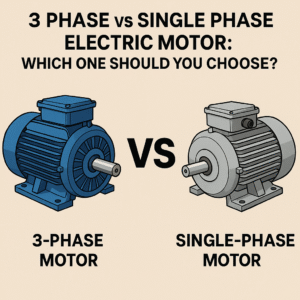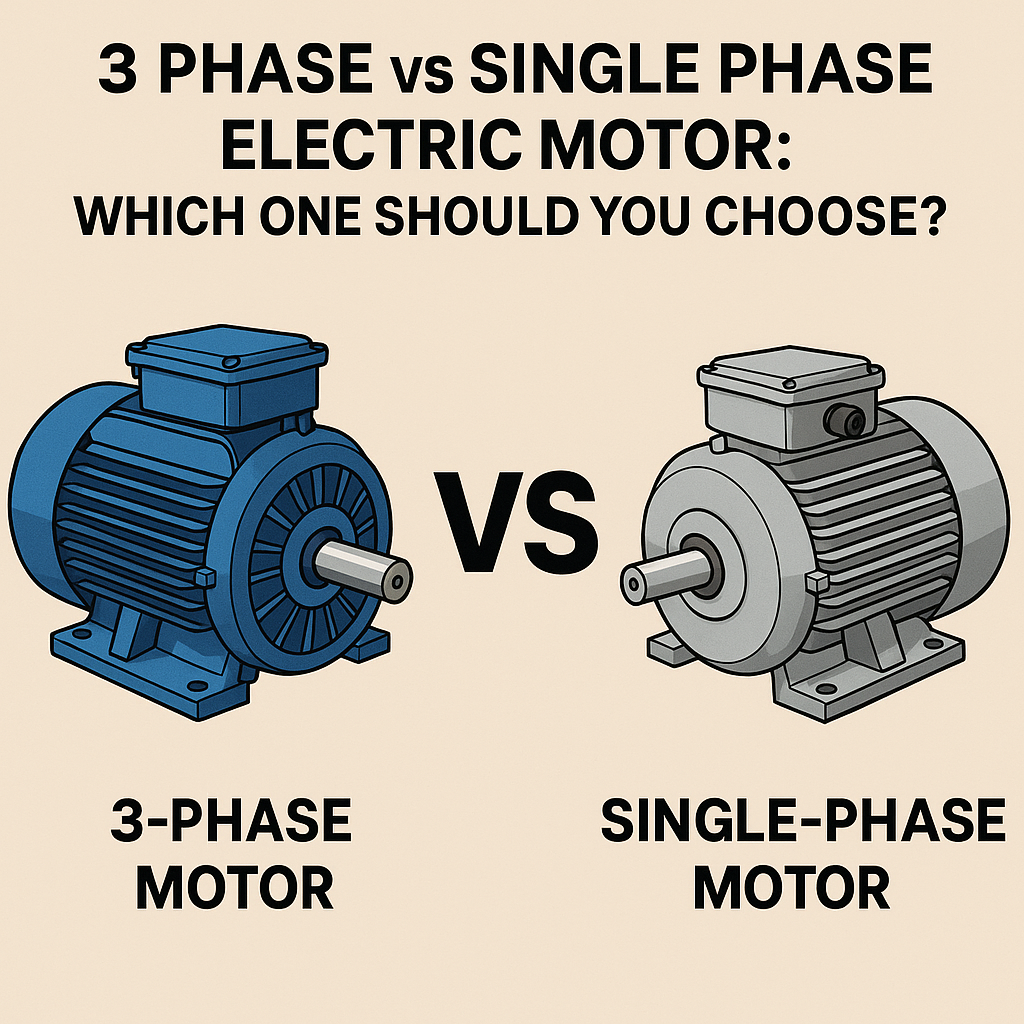When it comes to powering industrial machines, commercial applications, or even residential equipment, electric motors play a crucial role. But one of the most common questions buyers face is: Should you go with a single-phase motor or a three-phase motor?
At Anubhuti Power System, we specialize in manufacturing and supplying high-quality electric motors tailored for a wide range of industries. To help you make the right choice, let’s break down the key differences, advantages, and uses of 3-phase vs. single-phase electric motors.

🔌 Understanding the Basics
What is a Single-Phase Electric Motor?
-
A single-phase motor runs on a single-phase power supply (220V–240V).
-
It is commonly used in homes, workshops, and small-scale industries.
-
Power delivery is not continuous—there are fluctuations that may cause vibration or reduced efficiency.
What is a Three-Phase Electric Motor?
-
A three-phase motor operates on a three-phase power supply (380V–440V).
-
It is primarily used in industrial and heavy-duty applications.
-
Power delivery is continuous and balanced, which makes it more efficient and reliable.
⚡ Key Differences Between Single Phase and Three Phase Motors
| Feature | Single Phase Motor | Three Phase Motor |
|---|---|---|
| Power Supply | Runs on 1 phase (220–240V) | Runs on 3 phases (380–440V) |
| Efficiency | Less efficient | Highly efficient |
| Power Output | Suitable for small loads | Ideal for heavy loads |
| Starting Torque | Low | High |
| Durability | Moderate | Long-lasting & robust |
| Cost | Lower initial cost | Higher initial cost, but better ROI |
| Applications | Fans, pumps, household equipment | Industrial machines, compressors, conveyors |
✅ Advantages of Single-Phase Motors
-
Cost-effective for light applications
-
Easy installation and maintenance
-
Ideal for domestic and small business use
✅ Advantages of Three-Phase Motors
-
High efficiency and performance
-
Handles heavy machinery and continuous operations
-
Long life with low maintenance
-
Energy-efficient in the long run
🏭 Applications of Each Motor
Where to Use Single-Phase Motors:
-
Household appliances (refrigerators, washing machines, air conditioners)
-
Small water pumps
-
Fans, blowers, and office equipment
-
Light workshop machines
Where to Use Three-Phase Motors:
-
Industrial machines (compressors, conveyor belts, lathes)
-
Manufacturing units and factories
-
Agricultural pumps and irrigation systems
-
Heavy-duty HVAC systems
🔍 Which One Should You Choose?
-
Go with a Single-Phase Motor if:
You need a cost-effective solution for light-duty work such as home appliances, small workshops, or simple pumps. -
Choose a Three-Phase Motor if:
You require efficiency, power, and durability for industrial machinery, continuous operations, or heavy-duty applications.
At the end of the day, the choice depends on your application, budget, and power requirements.
💡 Why Choose Anubhuti Power System?
At Anubhuti Power System, we understand that selecting the right motor can directly impact your performance, energy efficiency, and long-term savings. That’s why we offer:
-
High-quality single-phase and three-phase electric motors
-
Customized solutions to match your requirements
-
Reliable performance and durability backed by advanced technology
-
Expert guidance to help you choose the right motor for your needs
🔧 Final Thoughts
Both single-phase and three-phase motors have their advantages. If you are running light appliances or small businesses, single-phase motors are more than enough. But if your requirements involve industrial operations or continuous heavy loads, investing in a three-phase motor will save you money and improve efficiency in the long run.
👉 At Anubhuti Power System, we are committed to delivering the right motor for the right job. Whether you need a robust three-phase motor for your factory or an efficient single-phase motor for small-scale use, we’ve got you covered.

